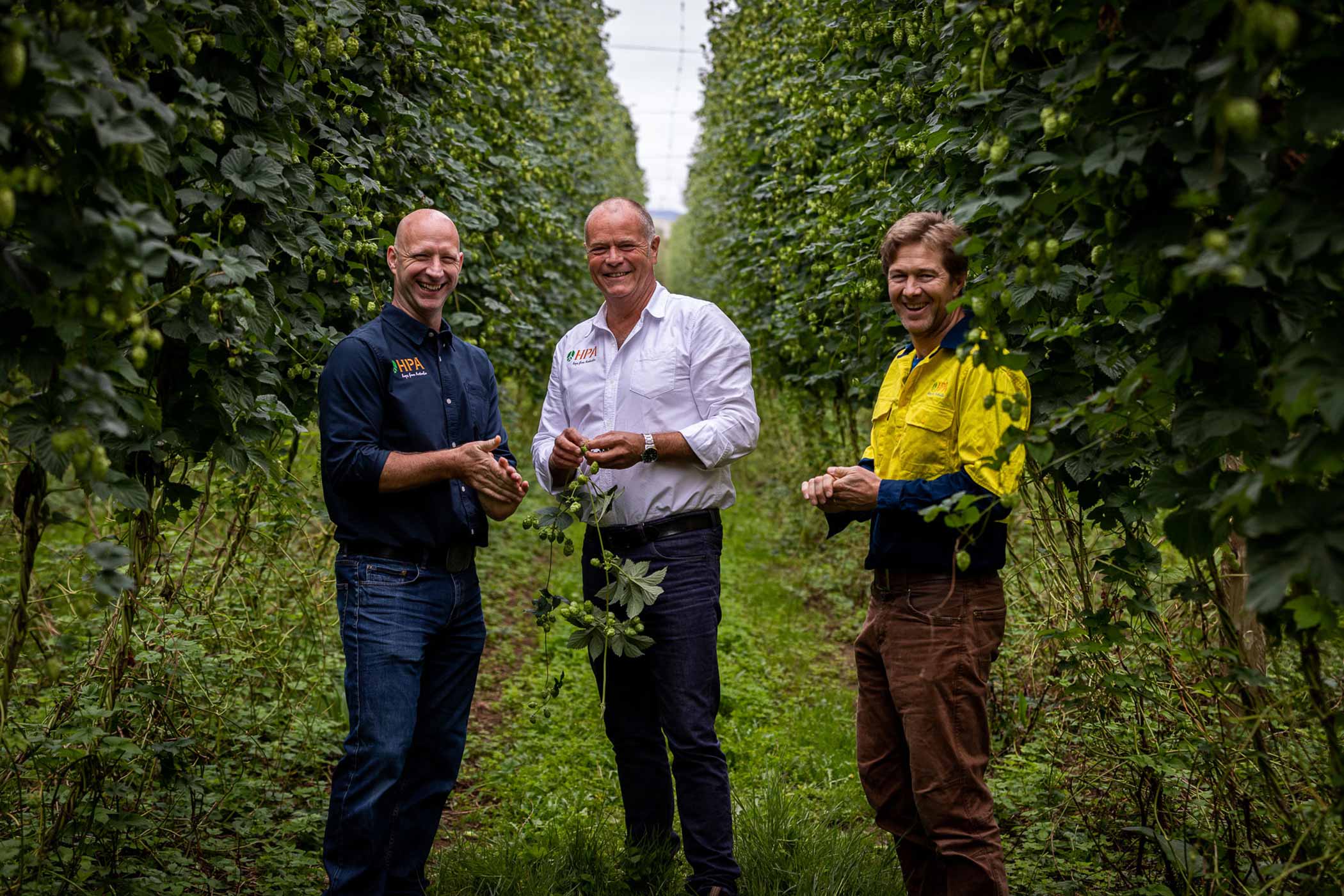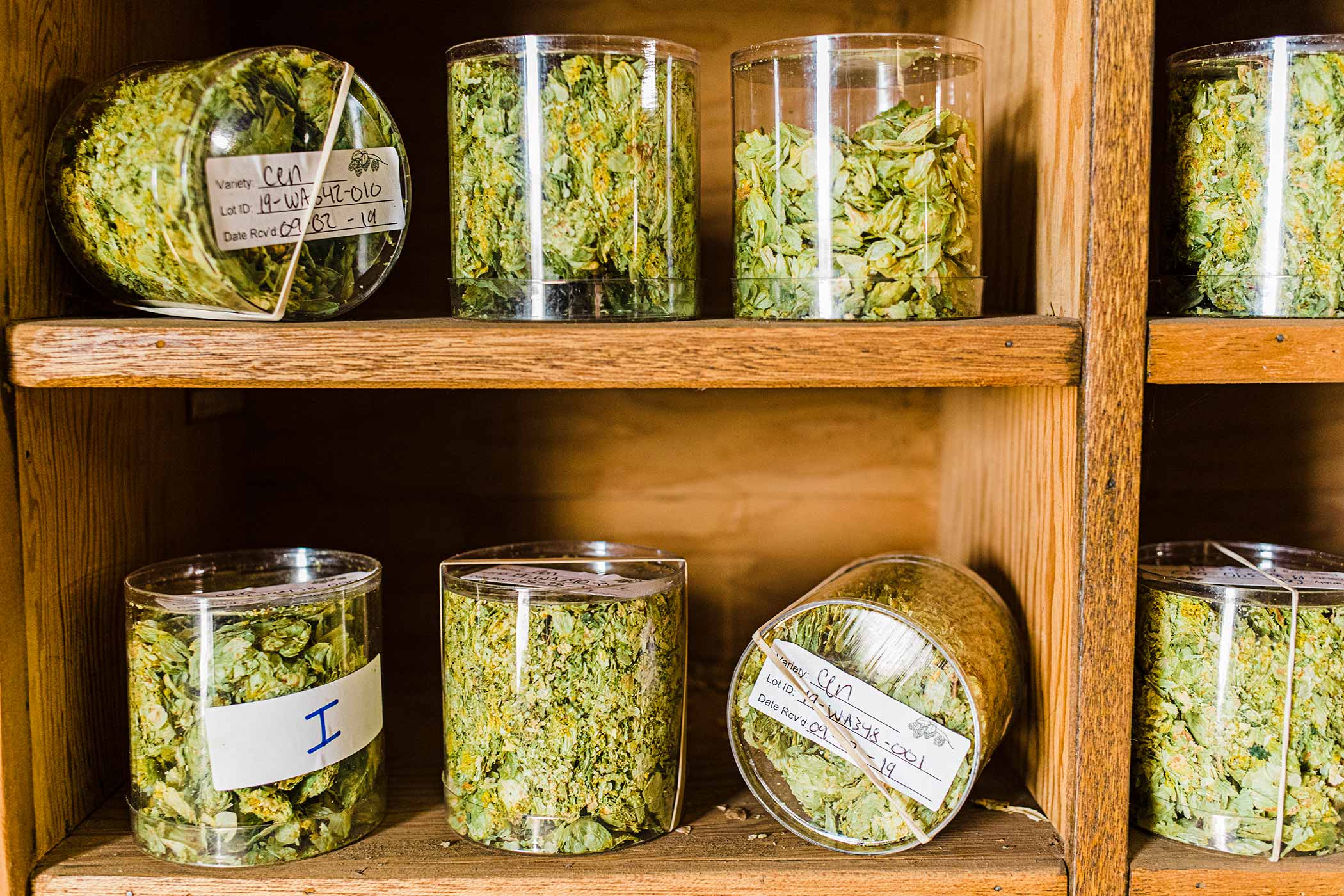Shop
Top 3 Awesome Australian Hops: Discover the Hops Reshaping Craft Beer
Galaxy, Vic Secret, Enigma, oh my!
Hey, Hops Are Hot:
Galaxy®, Vic Secret™, Eclipse®, Enigma®, Ella®, and Topaz™. What do all these hop varieties have in common? Not only are they some of the hottest hops in beer, but they’re all Australian hops. Over the past decade or so, the country and continent down under that has slowly pumped out some of the most unique aroma- and flavor-forward hops in the world. Ones that brewers, especially American brewers, clamor for to give their IPAs, hazies, pales, and other styles thunderous tropical flavor.
Much like the Pacific Northwest became known for citrusy, piney, resinous, dank hops, and Germany, the more spicy, earthy, and herbal, the country of Australia emerged with bines full of something totally different: passionfruit, guava, and even candy-like cones.
Without question, the most popular beer styles in America—hazies, double hazies, even American IPAs—benefit from the completely stratospheric flavor profile of Australian hops.
But that wasn’t always the case.
A Brief History of Hops In Australia
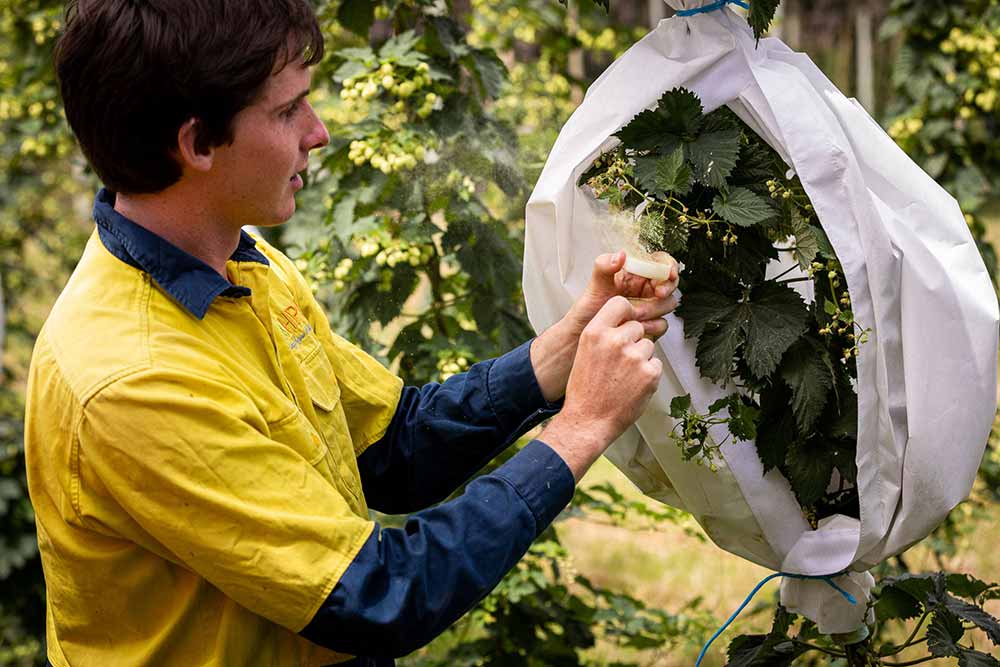
Photography courtesy of Natalie Mendham | Hop Products Australia
Unlike in North America and Europe, hops are not native to Australia.
Instead, Hop Products Australia (HPA) Head of Sales and Marketing Owen Johnston told Hop Culture that hops were introduced in Australia in 1803.
Over decades of industrialization and modernization, the industry started to stabilize.
In particular, smaller family growers shrank during the twentieth century, and more moderate producers grew, making less-than-reputable hops primarily for bittering.
“We were still growing alpha [hops] for bittering, as everyone was, but Aussie hops didn’t have a lot of diversity,” says Johnston.
For instance, Pride of Ringwood—the highest-alpha hop in the world when it first came to market in the 1960s. That hop became the mainstay of Australian hop growing for nearly fifty years.
But Pride of Ringwood didn’t necessarily impress.
“My experience with Australian hops previously was Pride of Ringwood and a few other American varieties grown over there, and they just didn’t do it well,” laughs Larry Sidor, founder of Crux Fermentation Project and one of the early adopters of Galaxy in the U.S. “They weren’t the best, I’ll put it that way.”
Johnston says that HPA cultivated a very high-alpha program but with the goal of replicating Northern Hemisphere varieties like Hallertau Mittelfrüh. If a harvest didn’t go well in Germany, brewers could find a viable derivative in Australia.
But toward the end of the twentieth century, HPA, which by then accounted for ninety percent of Australia’s hop acreage, started taking a different approach, according to Johnston.
For the first time, instead of breeding hops for bittering, flavor became the focus.
Johnston says, “When we changed the assessment criteria to flavor, we started to uncover some really interesting effects.”
The Game-Changing Gospel of Galaxy
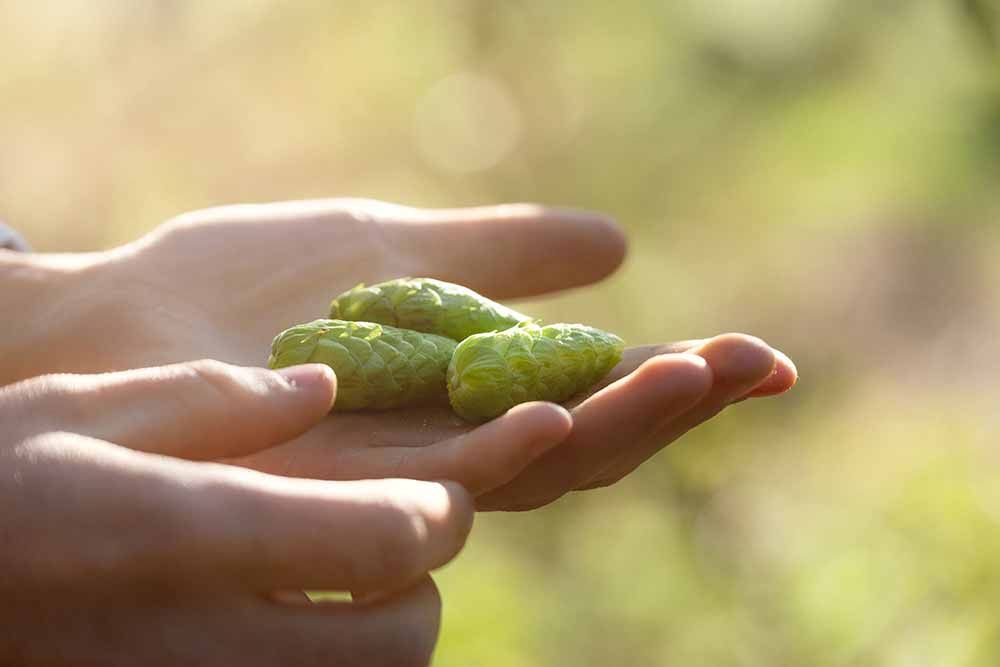
Photography courtesy of Betsy Wants In | Hop Products Australia
Name an Australian hop off the top of your head.
Did you think of Galaxy?
Currently one of the most recognized Australian hops worldwide, Galaxy started at HPA in 1994.
A cross-pollination of high-alpha Australian and Perle parents, Galaxy didn’t actually hit the commercial market until 2009.
Over fifteen years, HPA cultivated the hop, sending samples to breweries like Crux Fermentation in the U.S. and other local brewers to test.
The feedback immediately changed everything for the Australian hop market.
Sidor says when HPA first sent him samples of Galaxy, he thought, “Wow, these are incredible.”
“They filled a void that didn’t exist,” says Sidor. “When I got a hold of Galaxy, it was the first time a whole lot of tropical fruit, passionfruit, really came through.”
Johnston says the feedback HPA received centered on Galaxy’s absolute impact. “You put in a little bit; you got a lot out,” he says. “There was a high preference for this peachy, tropical thing Galaxy brought.”
A characteristic of Australian cones now, tropical-forward hops didn’t exist then.
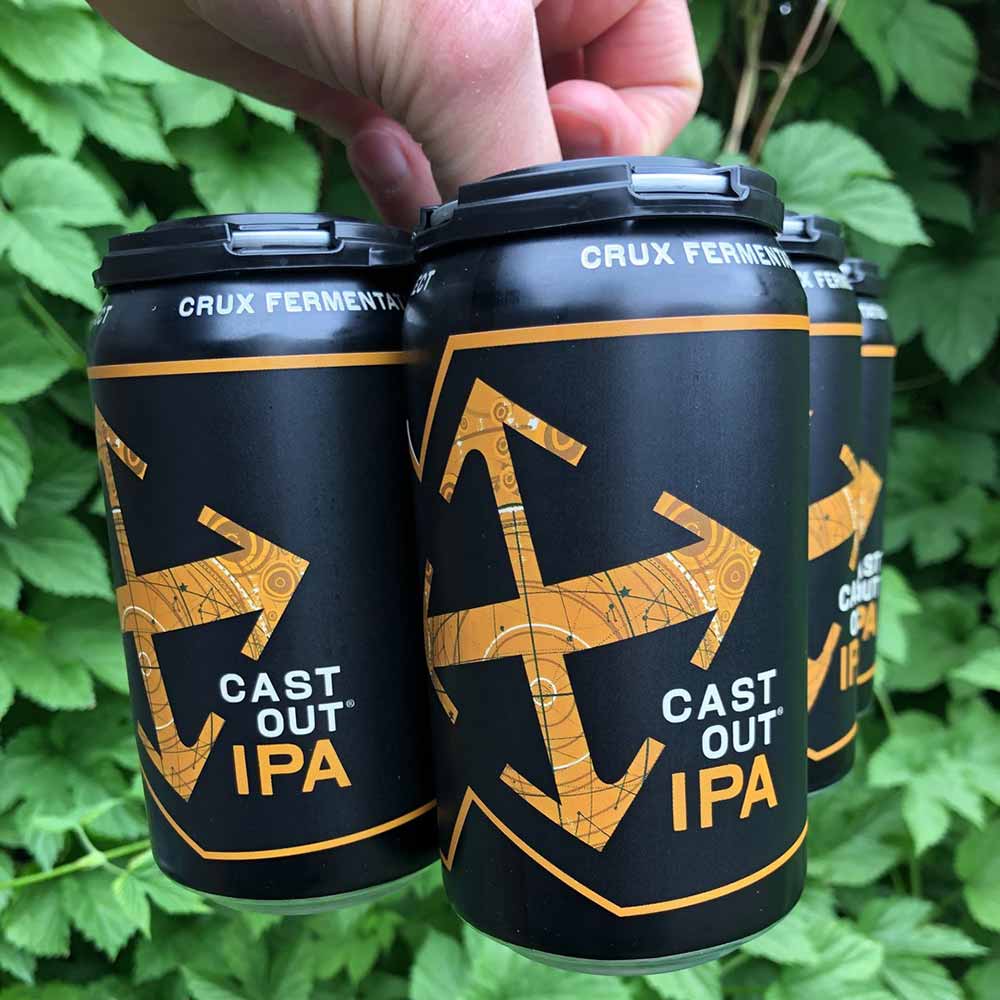
Photography courtesy of @cruxfermentationproject
Sidor says HPA couldn’t have picked a more perfect time to introduce Galaxy to the market. “Timing, as they say in business, is everything, and [HPA] couldn’t have been better if they would have known about what was to come,” says Sidor.
Think about it. In the early 2010s, the craft beer industry favored Pacific Northwest varieties like Cascade, Citra, Chinook, and Centennial for American and West Coast-style IPAs. But by 2015, with the advent of hazies, brewers searched for those bright, juicy, more citrus-centered hops
Galaxy took that sought-after matrix to the next level…to an entirely new stratosphere, if you will.
To this day, Sidor cites Crux Fermentation’s very first beer with Galaxy, Cast Out, as one of his all-time favorites.
Crux specializes in beers that surprise and delight, enticing you to take one sip and then another. According to Sidor, Galaxy provides that clean bitterness where “You’ll drink it and go, wow, this is good, take another sip, and as it warms up, you’ll get more … watermelon,” Sidor says, noting other descriptors such as tropical fruit, passionfruit, and guava.
Beers just pop with Galaxy. Think of brewing with this hop like adding the perfect amount of salt to a recipe. Once you sprinkle just the right amount of crystals, you’ll create a dish that sings.
A game changer when it hit the market, Galaxy put HPA on the map, for better or for worse.
While HPA couldn’t meet the demand initially, the capital raised from Galaxy helped HPA reinvest and reinvigorate its farms and infrastructure.
“[Galaxy] has absolutely revolutionized the awareness of Australia as a hop-growing region and of Australian varieties,” says Johnston.
Galaxy continues to dominate HPA’s portfolio today, drawing more and more interest from American brewers.
According to Johnston, the U.S. is HPA’s biggest marketplace per capita. In 2023, U.S. brewers accounted for 850,000kg of Galaxy hops, representing forty-six percent of HPA’s total production!
And back home in Australia, HPA’s 2023 harvest yielded 1,096 metric tonnes of Galaxy, up 8.8 percent from last year and the most out of any hop from Australia.
While Galaxy has thrived, it isn’t the only popular Australian hop.
Vic Secret: The Shadowy, Hidden Australian Hop
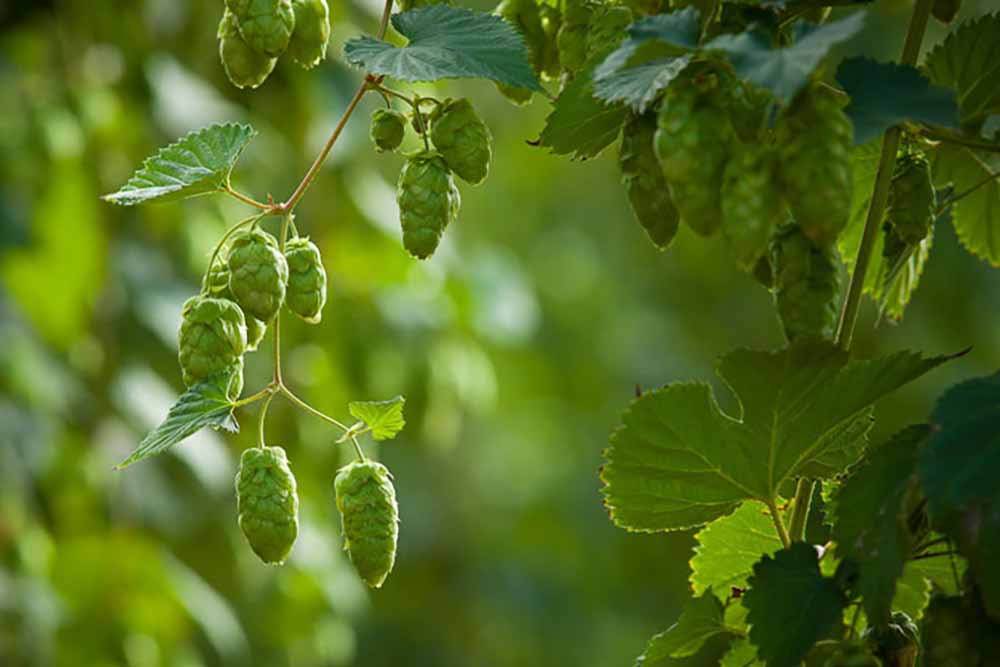
Photography courtesy of Hop Products Australia
“We’ve had Galaxy just dominate the airwaves, just dominate our bandwidth, and our allocation of resources to support Galaxy becoming a huge hop for us,” says Johnston. “It’s kind of like in its shadow; everything else has struggled to grow because they weren’t getting the daylight they needed. And Vic has slowly but surely crept and cribbed.”
Second in production only to Galaxy, Vic Secret produced 320 metric tonnes, up 10.3 percent, in 2023.
Although Galaxy grabs all the headlines, Johnston says you shouldn’t ignore Vic Secret.
Let’s call Vic Secret similar to the hidden secret of Australian hops.
“I think Vic Secret is a real dark horse,” says Johnston, noting that once brewers try Galaxy, they’re more likely to look at what else is in HPA’s portfolio. That’s when they notice Vic Secret.
But if we’ve learned anything from Aesop’s fables, slow and steady wins the race, right?
Growing steadily in Galaxy’s shadow, Vic Secret’s allure is actually just that—its role not as the protagonist but as the second-bit player.
Sidor says after Galaxy, at Crux Fermentation, they brew most with Vic Secret. “I get a lot of [phone calls] about, ‘Geez, Larry, we see you’re using Vic Secret. We haven’t had much luck with it. How are you doing it?’” he says, telling them, “We use that not as a primary hop but as a supporting actor.”
Johnston agrees, saying, “It doesn’t have to be the hero.”
Which is why he favors Vic Secret in a bigger, bolder beer like a classic West Coast IPA “where you’ve got some hop sweetness, and the pineapple lead descriptor on Vic is kind of this excellent way in which to layer in some complexity,” he says, mentioning that this potent hop stands up well to beer staples with more significant malt bills and higher alcohol levels. “It’s got that sort of dank, sweet pine thing that all comes back together and works beautifully in certain styles.”
While Sidor says you can still get those characteristic tropical notes from Vic Secret, “they aren’t sharp like they are with Galaxy, so it really rounds out the edges of a beer really well.” Sidor also finds Vic Secret “has a certain dankness to it.”
For the most part, Crux Fermentation sticks to IPA-land when brewing with Vic Secret.
But that’s not to say that brewers can’t experiment with Vic Secret in, say, a pilsner. However, Johnston says to proceed with caution. “The challenge of lighter beer styles … is dealing with those high alpha levels.”
Especially this year’s Vic Secret crop, which came in with “stonking big oils and alphas,” jokes Johnston. “You know the flavor impacts clean, you know it’s clear, you know it’s high-impact, and you know the consumers love drinking it, but it takes a little bit of skill sometimes to execute, depending on your beer style.”
Eclipse Exceeds Expectations
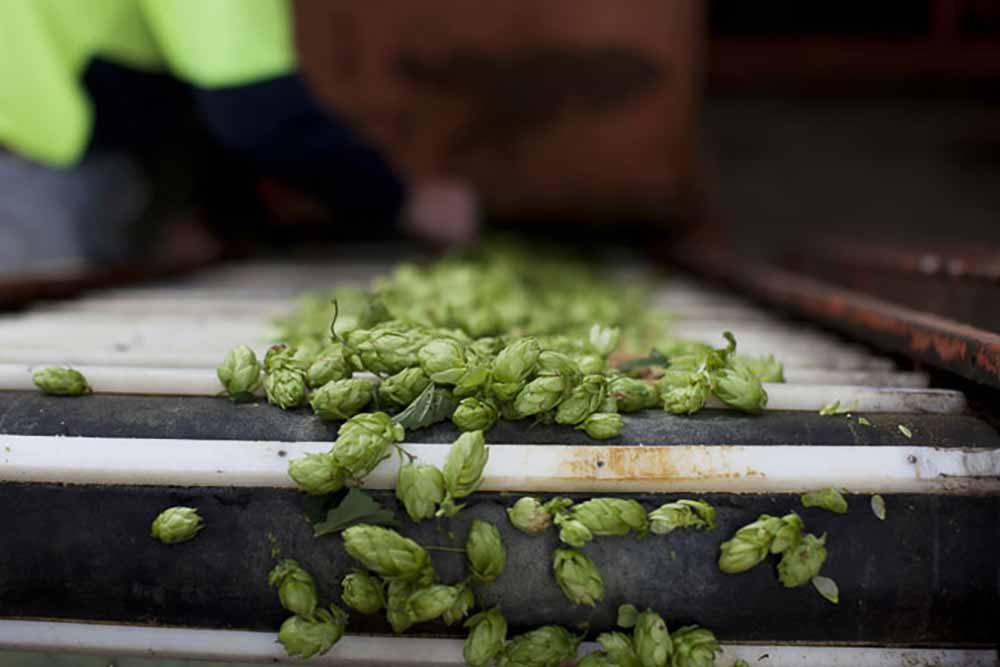
Photography courtesy of Hop Products Australia
Created in HPA’s breeding program in 2004, Eclipse increased production at a high clip in 2023. According to HPA’s 2023 Crop Report, HPA harvested 161 metric tonnes of Eclipse, an astonishing 70 percent increase from the previous year.
“The increases in Eclipse have been part of the planned trajectory to support market uptake,” says Johnston. “Eclipse continues to get great brewer feedback, both on the farm and in their finished beers.”
HPA initially tested Eclipse in 2012 before shopping around at different breweries from 2016-2019. Johnston says HPA looked for feedback on impact, differentiation, and flavor. According to him, even if Eclipse didn’t top the charts on impact every time, it had the highest preference score. “It just became overwhelming that people like this hop more than all the others,” he says.
Above all else, brewers found Eclipse to express a distinct flavor—mandarin. “It was always getting named up with a very high degree of confidence as mandarin in different beer settings, across different recipes, and in different beer styles,” says Johnston. “That, for me, is a powerful thing for brewers … I’m not trying to sell [Eclipse] as a hop that’s a fruit salad … this one actually does what it says on the label.”
Johnston says that providing a hop that delivers an advertised flavor with high impact and consumer preference every time can be invaluable.
Which could be a big reason why, when compared to Galaxy, Eclipse, across the board, actually performs better.
“I would say this is a ten-out-of-ten impact hop,” says Johnston. “It’s as easily identifiable as Galaxy … but probably has a general consumer preference higher than Galaxy.”
Johnston says while he’ll receive some feedback from folks who don’t like Galaxy, he’s rarely heard anything negative said about Eclipse. “I don’t see people turn around and say, cool, good hop, distinct, unique, high impact, and I don’t like it,” he says. “Everyone has that high preference for Eclipse.”
While Johnston shares HPA has no plans to grow production of Eclipse, they’re very excited to see how high this hop can climb (yes, that’s a bine pun).
What Is the Future For Australian Hops
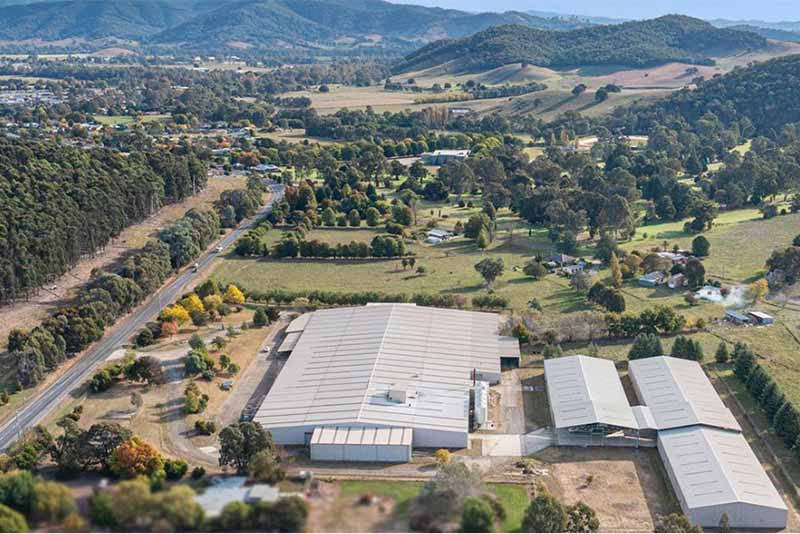
Photography courtesy of Hop Products Australia
Currently, Johnston says that HPA has followed a natural progression from the reinvigoration of their assets and infrastructure to expanding productivity to breeding new hops. The last piece of the puzzle will be the completion of a state-of-the-art, 22,000-square-metre, $20 million pellet plant.
Set to become operational by the spring harvest in 2024, hopefully, the new facility will include upgrading packing lines; refrigerated, temperature-controlled pelletizing lines; upgraded foil specs; and the works to double HPA’s current processing capacity.
“Everything is changing and all for the better,” says Johnson. “It’s going to be a game-changing step forward for us for crop 2024.”
All these changes come in the pursuit to continue to bring brewers around the world the hops that have put Australia on the map—Galaxy, Eclipse, Vic Secret, Ella, Enigma, etc.
For brewers, the expanded plant again comes at perhaps the perfect time, according to Sidor.
“The beer industry in the U.S. faces some headwinds with seltzers, ready-to-drink products that have a lot of fruit juices,” he says. “The Australian hop, with its tropical notes, fit into that niche really well.”
In Sidors’ eyes, beers with a more dominant tropical character can help the industry compete with other segments invading market share.
For consumers, this is also only good news because it means that we can continue to drink the tropical fruits of our alter egos in Oz.
“We’re pouring different paint colors into the paint pots, but [brewers] are the artist, right?” says Johnson. “Our role in this is to present choice and diversity in flavor building blocks to brewers so they can keep making delicious beverages.”
Ten Beers We Recommend Trying With Australian Hops
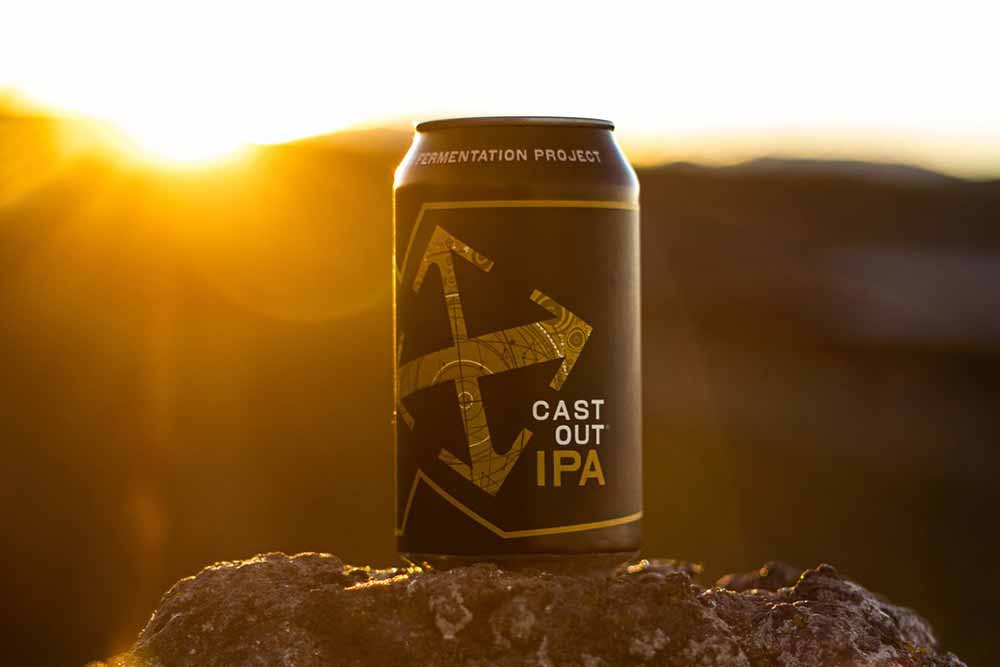
Photography courtesy of @cruxfermentationproject
When it comes to Australian hops, if you know, then you know. And if you don’t know, try some of these beers, and then you’ll know.
Cast Out – Crux Fermentation Project
American IPA – The very first commercial beer Sidor brewed at Crux Fermentation with Galaxy back in 2011-2012, Cast Out is a 7% ABV West Coast IPA that explodes in the glass.
A little bit more malt-forward, with two-row American barley and pilsner malt, Cast Out expertly showcases the power of Galaxy.
“You open up the can, pour it into a glass, and the first thing you’ll do is get that tropical fruit, passionfruit, and guava notes,” says Sidor.
Registering relatively high in bitterness at 60 IBUs, Sidor emphasizes this is a very clean bitterness, thanks to the Galaxy.
“With Galaxy, it has a pretty clean bitterness,” he says. “Except for the seven percent alcohol, I can drink quite a few!”
Galaxy-Hero – Revolution Brewing Company
American IPA – Originally brewed for the Chicago Comic and Entertainment Expo, Galaxy-Hero is the American IPA for those hopheads who want to geek out. “This IPA shoots a raygun blast of Galaxy and Zythos hops into your mouth and leaves a crisp, dry finish,” writes Revolution.
Double Galaxy – Hill Farmstead Brewery
DIPA – Dry-hopped exclusively with Galaxy, Double Galaxy lives up to its simple yet effective name. This beer can’t be beat for a true reflection of Galaxy’s potential.
Galaxy Dry Hop Pseudo Sue – Toppling Goliath Brewing Co.
American Pale Ale – Because we wanted to show you that not all beers with Galaxy need to be IPAs! Galaxy Dry Hop Pseudo Sue takes Toppling Goliath’s immortal American pale ale and adds a dry hop of pure Galaxy.
Hey, if a comet killed all the dinosaurs, maybe a Galaxy could bring them back to life.
Here Galaxy’s roar in this American pale ale with guava, mango, and passionfruit notes.
Double Dry Hopped Congress Street – Trillium Brewing Company
American IPA – A hopped-up version of Congress Street IPA, Double Dry Hopped Congress Street was brewed precisely to paint all the colors of the Galaxy rainbow. Expect peach, stone fruit, citrus, and perhaps little pine explosions. Like colors on a palette, all the notes of this American IPA meld together for a creamy, rich, and effortlessly effervescent sip.
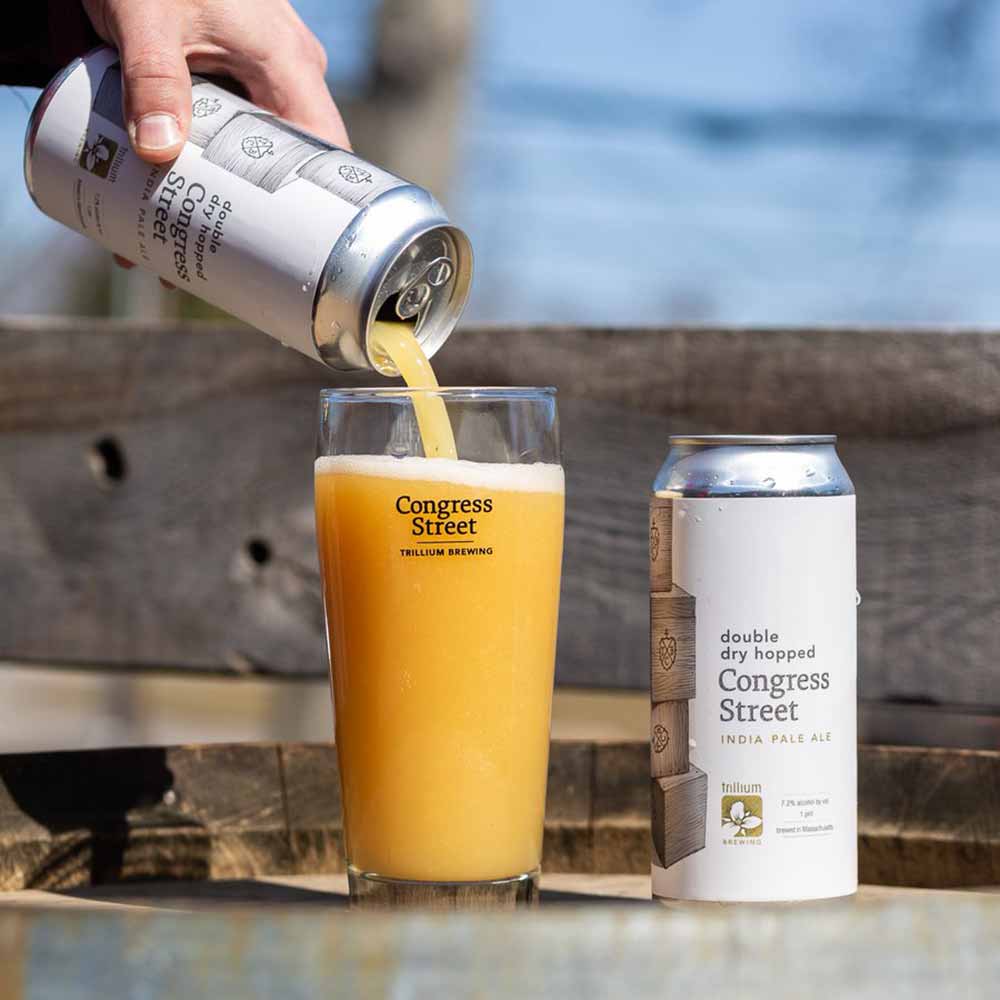
Photography courtesy of Trillium Brewing Company
Bright Galaxy – Tree House Brewing Company
DIPA – It is often the stewards that we want to continue leading the way. Perhaps one of the most iconic IPA-producing breweries in the country, Tree House tempted its hand and what they call their favorite Southern Hemisphere hop—Galaxy.
In Bright, Galaxy gives off notes of orange Push-Ups, Sprite soda, and pineapple juice. With Tree House’s characteristic fluffy finesse, Bright provides a perfect foil to let Galaxy truly shine.
As the brewery writes in the Untappd description, “With this beer, you get pure Galaxy candy, and what a sweet treat it is!”
Single Hop Eclipse – Ever Grain Brewing Co.
Double Hazy IPA – The popularity of Eclipse is still growing, so finding beers that give the spotlight to this hop seem to be few and far between. But our friends at Ever Grain came in clutch, brewing a double IPA hopped solely with Eclipse. Described as evoking “notes of sweet pine sap, pulpy orange juice, and a touch of ripe tropical passion fruit,” Single Hop Eclipse sounds like a beer we want to sink our teeth into.
Bushy Park – Crux Fermentation Project
American IPA – Another of Sidor’s favorite beers made at Crux Fermentation, Bushy Park showcases Vic Secret and Galaxy. The brewery describes this one as a “modern IPA packed with distinctive flavors of passion fruit and pineapple along with a pinch of pine.”
Everybody Wants Some “Vic Secret” – Hoof Hearted Brewing
DIPA – Remember what we said earlier about Vic Secret working best as a supporting character? Well, Hoof Hearted chucked that all out the window. And if you know Hoof Hearted well at all, they always buck convention. And we’re all the happier for it.
A part of the brewery’s rotating single-hop DIPA series, Everybody Wants Some “Vic Secret” follows the brewery’s quest to showcase one hop at a time against a simple base of pilsner malt and oats.
In this DIPA, you’ll get Vic Secret on full display. So if you want to really understand this enchanting interplay of pine and passionfruit, give this beer a gander.
Fractal Vic Secret – Equilibrium Brewery
American IPA – The mad laboratory masters of intricate IPAs, Equilibrium applies straight-up “S”cience to their rendition of an American IPA with Vic Secret. Falling under their Fractal series, a lineup of beers literally designed to experiment with fundamentals and ingredients, Fractal Vic Secret clashes together atoms of pineapple and passion fruit. As the brewery writes in the beer’s Untappd description, “The medley of characteristics makes the name ‘Fractal Vic Secret’ warranted indeed.”

